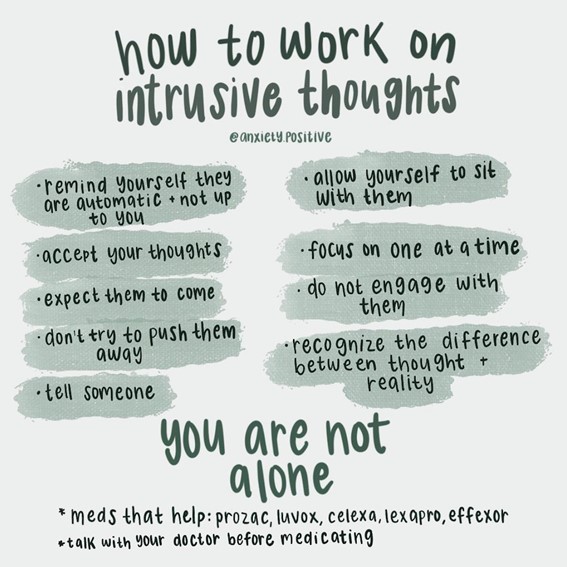Intrusive thoughts
Intrusive thoughts
Never one to shy away from the difficult conversations, this week we’re looking a topic that people often struggle to talk about – which for me is just another great reason for opening the discussion up. We’re talking about intrusive thoughts, which are unexpected images or thoughts that seem to randomly pop into your head. They’re often unpleasant – either violent or sexual – and usually go against our values and beliefs, which only serves to make them more awful. Firstly, it’s super important to stress that EVERYONE has intrusive thoughts from time to time. Thoughts like, “I could maybe just drive my car into that tree” (when you aren’t struggling with depression or suicidal ideation) or, having the sudden image of a teacher or family member naked or even having sex with someone flash through your mind. Shocking, out of character and absolutely not something you’d want to do, know, or usually think about. This is your brain, doing what it is designed to do, which is to consider all (even random and yucky) options. Recognising that they’re just random thoughts, and not ascribing any significant meaning to them or having any desire to act on them then intrusive thoughts like these can just be harmless and unproblematic. When they happen often, are distressing or interfering with daily life then maybe it’s something to talk about.

Types of intrusive thoughts:
- Germs, infections or contamination (we saw a bit of spike of these ones thanks to COVID-19, unsurprisingly)
- Spirituality, religion, blasphemy or being somehow immoral
- Sexual acts or situations
- Violent acts that are either individual or on a larger scale (e.g., bombings)
- Fears about doing things wrong or leaving things unfinished
- Speaking out or acting out publicly and with humiliation
To help put intrusive thoughts into perspective, a study in 2014 found that 94% of participants had at least one intrusive thought in the three months prior to the study. Within this study the so-called ‘doubting intrusions’ (the worry about doing tasks correctly) were the most common whilst thoughts of a sexual or religious theme were the least reported. But when intrusive thoughts start to interfere with daily functioning, or when there is a drive or compulsion to control or take action(s) to control the thoughts then we might need to better understand what might be going on.
Indications that there might be something more going on:
- If intrusive thoughts last longer than a fleeting moment
- Repeatedly pop back into your head (or they loop)
- If they cause you distress (or more distress over time
- They make you feel that you have to do things to control them
Links to mental health conditions
Sometimes these intrusive thoughts are related to or are symptoms of mental health conditions such as:
- OCD (obsessive compulsive disorder)
- PTSD (posttraumatic stress disorder)
- Eating disorders (ED’s)
Where these are present then we really need to work with a team that specialise in the under-lying conditions – sometimes that means a therapist or psychologist who works specifically with OCD/PSTD/ED’s as well as a psychiatrist who also specialises in the relevant field. When intrusive thoughts have more complex (often clinical) roots we might explore adjunctive medications alongside various treatment modalities including Exposure Therapy and EMDR that help to reduce sensitivity around the thoughts and their contents.
Additional resources:
- OCD Australia: https://www.ocdaus.org/
- Article by Penny Moodie: https://www.smh.com.au/national/under-siege-from-your-brain-as-ocd-rates-soar-a-woman-hopes-her-memoir-will-help-20230901-p5e1cg.html Here book ‘The Joy Thief’ is coming out soon.
- Podcast episodes:

If this blog has brought up something in your life that you’d like the space to explore, we have a team of trauma-informed therapists at Thea Baker Wellbeing and we have IMMEDIATE availability – please reach out to us at: hello@theabaker.com.au / 03 9077 8194.
Radomsky AS. et al. Intrusive thoughts on six continents. Journal of Obsessive-Compulsive and Related Disorders, 2014,3(3): 269-278. https://doi.org/10.1016/j.jocrd.2013.09.002.
